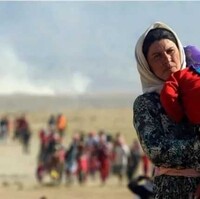Iraq: per Human right watch gli abusi sui prigionieri possono essere configurati come crimini di guerra
Iraq: U.S. Prisoner Abuse Sparks Concerns Over War Crimes
Investigation Should Probe Role of Superiors, Private Contractors
(New York, April 30, 2004) -- The promised U.S. investigation into the mistreatment of Iraqi prisoners should not stop with the lower-level soldiers who were immediately involved, Human Rights Watch said today. The United States should also investigate the superiors of these soldiers to see whether they ordered or knowingly tolerated these abuses.
"The brazenness with which these soldiers conducted themselves, snapping photographs and flashing the 'thumbs-up' sign as they abused prisoners, suggests they felt they had nothing to hide from their superiors."
Kenneth Roth, executive director of Human Rights Watch
Photographs in media accounts show U.S. military personnel in Baghdad subjecting Iraqi detainees to humiliating and degrading treatment—and perhaps committing war crimes. Defense counsel for one of the accused soldiers claims that the soldiers had been ordered to "soften up" the detainees for interrogation. Moreover, private contractors allegedly were among those overseeing the interrogation process.
"The brazenness with which these soldiers conducted themselves, snapping photographs and flashing the 'thumbs-up' sign as they abused prisoners, suggests they felt they had nothing to hide from their superiors," said Kenneth Roth, executive director of Human Rights Watch. "Their superiors should be closely scrutinized to see whether they created an atmosphere of impunity that fostered this abuse."
The photographs show U.S. soldiers smiling, posing and laughing while naked Iraqi prisoners were stacked in a pyramid or positioned committing simulated sex acts. The 1949 Geneva Conventions prohibit "outrages upon the personal dignity, in particular humiliating and degrading treatment" against any detainee. Mistreatment that amounts to "torture or inhuman treatment" is a grave breach of the Geneva Conventions—or a war crime.
The record of the United States in addressing alleged mistreatment of detainees by its personnel in Iraq and Afghanistan causes serious concern. In Afghanistan, as Human Rights Watch has previously reported, the U.S. government has yet to provide information on its investigations into the officially declared "homicide" deaths more than two years ago of two detainees in U.S. custody at Bagram airbase. The United States has also not adequately responded to allegations of other abuses in U.S. detention in Afghanistan, including cases of beatings, severe sleep deprivation, and exposure of detainees to extreme cold.
In Iraq a U.S. army lieutenant colonel who admitted that in August he threatened to kill an Iraqi detainee, firing a shot next to the man's head during a violent interrogation, received a fine as a disciplinary measure, but was not subjected to a court martial. The U.S. army in January discharged three reservists for abusing detainees at a detention camp near Basra in southern Iraq.
"It's clear that the United States has not taken the issue of prisoner abuse seriously enough," said Roth. "These sordid photos from Iraq show that systematic changes in the treatment of prisoners are needed immediately. The investigations should be made public."
The alleged involvement of private contractors is another dimension of the problem that merits investigation. Human Rights Watch is concerned that these contractors operate in Iraq with virtual impunity—exempt by the terms of their engagement with the U.S. military from prosecution by Iraqi courts, outside the military chain of command and thus ineligible for court-martial, and not subject to prosecution by U.S. courts. Under the Geneva Conventions, the United States nonetheless remains responsible for the actions of those running the detention facilities, be they regular soldiers, reservists or private contractors.
"If the Pentagon seeks to use private contractors in military or intelligence roles, it must ensure that they are subject to legal restraints," said Roth. "Allowing private contractors to operate in a legal vacuum is an invitation to abuse."
Articoli correlati
- Il 26 maggio 2004 il New York Times riconobbe i propri errori pubblicando un articolo
Le presunte armi di distruzione di massa di Saddam in Iraq
Giornali come il New York Times, fino al 2003 ostili alla guerra, finirono per accettare come veritiere le affermazioni di Powell e per considerare ineluttabile l'intervento armato. A guerra terminata non fu trovata alcuna traccia di quelle fantomatiche armi.16 novembre 2023  "Breaking News", una volta tanto in positivo
"Breaking News", una volta tanto in positivoIl Regno Unito riconosce i crimini dell'ISIS contro gli Yazidi
Cercare giustizia è necessario per coloro che hanno perso la vita e per le vittime sopravvissute. E la storia merita di essere riconosciuta.2 agosto 2023 - Gulala Salih Un recente studio scientifico ripropone la questione
Un recente studio scientifico ripropone la questioneProblemi di salute mentale dei veterani e militari americani
Dopo due decenni di guerra continua in Afghanistan, una crescente popolazione di veterani si presenta per cure di salute mentale. La depressione rimane una delle principali condizioni di salute mentale nei militari. E ogni anno più di seimila si suicidano. How to fight against war disinformation? Julian Assange shows a way
How to fight against war disinformation? Julian Assange shows a way"My one and only New Year's Resolution": Letter from an ex-pacifist (now no longer "ex")
January 1st of each year is the time for formulating resolutions to keep or break (usually the latter) during the 365 days ahead. So Martina, an ex-pacifist who now is no longer “ex”, has decided to make only one resolution for 2023. “That way,” she says, “I’m sure to keep it.”8 gennaio 2023 - Patrick Boylan
Sociale.network